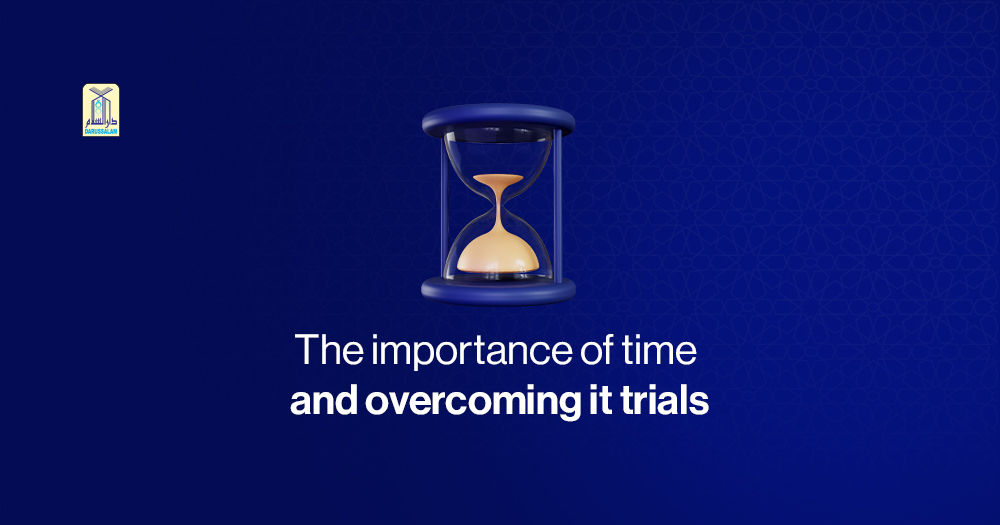Preface:
Procrastination, the delay of tasks and responsibilities, is a challenge that affects many, but it is particularly significant in the context of spiritual and moral obligations in Islam. The Quran and Hadith offer profound guidance on overcoming this trial, emphasizing the importance of time and the urgency of fulfilling one’s duties.
In Surah Al-Asr, Allah swears by time, highlighting its invaluable nature and the need to make the most of it. Allah stating:
وَالْعَصْرِ, إِنَّ الْإِنْسَانَ لَفِي خُسْرٍ .
“By time, indeed, mankind is in loss,” (Surah Al-Asr:1-2),
Allah is urging believers to use their time wisely. Procrastination can hinder spiritual growth, delay repentance, and prevent the accomplishment of good deeds. The Prophet Muhammad (PBUH) warned against wasting time, saying:
نِعْمَتَانِ مَغْبُونٌ فِيهِمَا كَثِيرٌ مِنَ النَّاسِ: الصِّحَّةُ وَالفَرَاغُ
“There are two blessings which many people lose: health and free time. (Sahih Bukhar:6412)
Islam encourages promptness and diligence, emphasizing that the delay of a good deed is akin to losing precious moments that could have been used to earn Allah’s pleasure.
The great concept of Barakah (blessing) in time is central, where even short periods of focused effort can yield immense reward when aligned with purpose. By prioritizing tasks, seeking Allah’s assistance through prayer, and maintaining a sense of responsibility, Muslims can overcome procrastination and ensure that their time is invested in actions that lead to really success.
Definition of Time:
The term “time” can be defined in the below sentence that “the measured or measurable period during which an action, process, or condition exists or continues.” Its smallest unit is the second, then goes on to minutes, then hours, then days and months etc. The beauty of time is that it never stops and is always moving continuously.
Remember that proper use of time makes a person successful here and hereafter, while misuse of this time becomes a curse for a person. Therefore, it is important that a person should spend this unique blessing of Allah Almighty with caution so that he can live a better life. The following are some points on the importance of time and how to manage it.

1. Time: A Gift from Allah
Time is a precious gift from Allah, and in Islam, it is considered one of the most valuable resources entrusted to humanity. Allah has given us time as a means to fulfill our purpose in life—worshiping Him, doing good deeds, and seeking knowledge. Each moment is an opportunity for spiritual growth, reflection, and self-improvement. Islam teaches that time should not be wasted on idle pursuits or trivial matters, but rather should be used wisely for activities that bring us closer to Allah. The Prophet Muhammad (PBUH) emphasized the importance of time in several hadiths, urging believers to take advantage of their time before it slips away.
Time is fleeting, and once it is gone, it can not be regained. Therefore, Muslims are encouraged to prioritize their responsibilities, seek balance in their daily activities, and remain conscious of the limited time they have. The concept of time in Islam also reminds us of the Day of Judgment when we will be held accountable for how we spent our time. By recognizing the value of time as a gift from Allah, Muslims strive to use it in ways that lead to eternal success in the Hereafter. Thus, time is not just a measure of days and hours but a divine blessing to be cherished and managed with care.
2. The Concept of Time in the Quran: Insights from Divine Revelation
In the Qur’an, time is portrayed as a finite and valuable resource, reminding believers of its fleeting nature and the importance of using it wisely. Allah swears by time saying,
By time, indeed mankind is in loss” (Surah Asr:1-2).
This highlights the urgency of utilizing time for good deeds and righteous actions. Time is portrayed as something that runs out, and no matter how hard one tries, it cannot be stopped or reversed.
The Qur’an frequently underscores that every moment of life is a test, and we are accountable for how we use our time. Surah Al-Mulk verse no. 15) reminds us that Allah has made the earth subservient to us for a limited period. Allah says:
“It is He who made the earth tame for you – so walk among its slopes and eat of His provision – and to Him is the resurrection”
This implies that time is a tool for seeking Allah’s pleasure and fulfilling our duties on earth and on a mentioned time all of you will be resurrected to Allah almighty.
Prophet Muhammad (PBUH) also emphasized the value of time, particularly in his hadith. He PBUH said:
Take advantage of five before five: your youth before your old age, your health before your sickness, your wealth before your poverty, your free time before your preoccupation, and your life before your death. (Al-mustadrak Lil-Hakim:7846).
The Prophet’s words remind us to prioritize good deeds and actions while we still have enough time to do them before there will no time to do them.
The Qur’an and Hadith both stress that time is a trust from Allah, and we are accountable for how we spend it. In Surah Al-Qiyamah verse no. 36, Allah almighty says:
Does man think that he will be left neglected?” indicating that every moment will be accounted for on the Day of Judgment.
The concept of time, therefore, serves as a reminder of our transient nature and the necessity to live purposefully in accordance with Allah’s guidance. Time is not just a resource; it is a test that shapes our eternal destiny.
3. The Hadith on Time: Teachings of the Prophet Muhammad (PBUH) on Productivity
Prophet Muhammad (PBUH) emphasized the importance of managing time effectively and avoiding procrastination, reflecting the guidance found in the Qur’an. He taught that time is a valuable resource, and wasting it is a serious matter. In a well-known hadith, he said:
Take advantage of five before five: your youth before your old age, your health before your sickness, your wealth before your poverty, your free time before your preoccupation, and your life before your death. Al-mustadrak Lil-Hakim:7846.
This statement urges Muslims to make the most of their time, especially during periods of ease and opportunity.
The Prophet (PBUH) also emphasized the need for prompt action and the avoidance of delay. The Prophet said:
Be in this world as if you were a stranger or a traveler. (Sahih Bukhari:6416)
This hadith reflects the idea that time should be used efficiently and without procrastination just as traveler, because delaying important tasks only leads to wasted opportunities.
In another hadith, the Prophet (PBUH) taught the importance of early morning time, saying, “O Allah, bless my nation in its early hours” (Sunan Abi Dawud:2606). This highlights the significance of starting the day early, as the early hours are seen as productive and full of barakah (blessings).
The Prophet’s (PBUH) teachings also stress balancing worldly duties and spiritual obligations. He encouraged his followers to structure their time between worship, work, family, and personal care. For instance, he dedicated time for prayer, reflection, and engagement with his companions, all while being mindful of his earthly responsibilities.
The teachings of the Messenger of Allah PBUH discourage people from abandoning worldly responsibilities and becoming engrossed in worship. This hadith makes it clear that the Prophet (peace and blessings of Allah be upon him) encouraged combining worship and worldly matters. One of the companions of the Messenger of Allah PBUH began to devote all his time to worship and separated himself from worldly affairs. The Prophet PBUH called him. When he came to the Prophet, The Prophet said: ‘O Uthman, did you dislike my practice? He said: No, by Allah, but I seek your practice. He said: I sleep, I pray, I keep fast, I (sometimes) leave fast, and I marry women. Fear Allah, ‘Uthman, your wife has a right on you, your guest has a right on you, your self has a right on you; you should keep fast and (sometimes) leave fast, and pray and sleep. (Sunan Abi Dawud:1369)
Furthermore, Prophet Muhammad (PBUH) advised against overindulgence in leisure, cautioning that excessive idleness is harmful. He said, “The strong believer is better and more beloved to Allah than the weak believer, while there is good in both” (Sahih Muslim: 2664), meaning that time should be used in ways that enhance both physical and spiritual strength.
Overall, the teachings of Prophet Muhammad (PBUH) emphasize using time wisely, avoiding procrastination, and being productive in all areas of life, both for the benefit of this world and the Hereafter.
4. The Danger of Procrastination
Procrastination is a dangerous habit that can negatively impact a person’s spiritual, social, and worldly obligations in Islam. The Qur’an and Hadith emphasize the urgency of fulfilling one’s duties without delay, warning that procrastination leads to missed opportunities and spiritual decline. Allah says in Surah Al-Baqarah verse No. 286, “Allah does not burden a soul beyond that it can bear,” suggesting that delays in fulfilling obligations only lead to unnecessary burdens and stress.
In the context of faith, procrastination weakens one’s relationship with Allah. The Prophet Muhammad (PBUH) warned against delaying acts of worship and ordered to do all acts or worship on their good time. Delaying acts of worship such as prayer, fasting, or giving charity can create a gap in spiritual growth and weaken a person’s commitment to their faith.
In terms of worldly duties, procrastination leads to missed opportunities and can cause significant stress. The Prophet Muhammad (PBUH) said, “Do not delay the prayer when its time has come” (Sunan Tirmidhi: 23). This applies not just to prayer but to all duties. Delaying obligations, whether they are related to family, work, or community, can result in disorganization and the accumulation of unmet responsibilities.
Procrastination also harms relationships and trust within the community. When a person continually delays fulfilling promises or duties, they risk damaging their reputation and trustworthiness. The Prophet (PBUH) said, “The signs of a hypocrite are three: when he speaks, he lies; when he promises, he breaks his promise; and when he is entrusted, he betrays” (Sahih Bukhari: 33). This hadith emphasizes that delaying responsibilities, whether personal or social, is a form of dishonesty.
Moreover, procrastination can lead to regrets on the Day of Judgment, as people will be held accountable for their time and actions. In Surah Al-Asr (103:1-3), Allah swears by time, highlighting that humanity is in loss unless they act righteously. Procrastination hinders righteous actions, causing individuals to fall behind in fulfilling their obligations both in this world and the Hereafter.
Therefore, Islam strongly advises against procrastination, encouraging prompt action in all aspects of life. Through discipline and time management, one can avoid the negative consequences of delay and strive for success in both this life and the Hereafter.
5. Time Management in Islam: (Balancing Worship, Work, and Rest)
Time management in Islam is about balancing worship, work, and rest in a way that pleases Allah and fulfills one’s worldly responsibilities. The Qur’an and Hadith emphasize the importance of structure and discipline in daily life. First and foremost, worship is central to a Muslim’s life, and acts like prayer (Salat), fasting, and remembrance of Allah (Dhikr) must be prioritized. The Prophet Muhammad (PBUH) said, “Your body has a right over you, your soul has a right over you, and your family has a right over you” (Sahih Bukhari: 1975), which highlights the need for a balanced approach to life.
Work is also essential, as Islam encourages earning a livelihood and contributing to society. Prophet Muhammad (PBUH) said:
No one eats better food than that which he eats from the work of his own hands” (Sahih Bukhari:2072). Hence, managing time effectively includes fulfilling professional duties while maintaining integrity and honesty. However, Islam warns against overworking and neglecting spiritual practices or personal well-being.
Rest and relaxation are also important; the Prophet (PBUH) encouraged taking time for oneself to recharge. He said, “The strong person is not the one who can wrestle, but the one who can control himself when angry” (Sahih Bukhari:6114), pointing to the need for emotional and physical balance.
The key to successful time management in Islam is planning each day with intention, setting aside specific times for prayer, work, family, and rest, and avoiding procrastination. Muslims are encouraged to begin each day with the remembrance of Allah, work diligently, and use free time wisely for relaxation or beneficial activities. By adhering to this balanced approach, a Muslim can achieve success in both this world and the Hereafter.
6. The Five Daily Prayers: A Structure to Optimize Your Day
The five daily prayers (Salat) in Islam provide a natural structure to one’s day, promoting discipline, focus, and mindfulness. Each prayer is spread throughout the day—Fajr at dawn, Dhuhr at midday, Asr in the afternoon, Maghrib at sunset, and Isha at night—helping Muslims to pause, reflect, and reconnect with Allah. This regular rhythm fosters a sense of purpose, as each prayer marks a dedicated time for spiritual reflection and breaks the day into manageable segments. The practice of Salat not only ensures spiritual nourishment but also enhances time management by promoting balance, setting priorities, and encouraging discipline in daily activities. Through these prayers, a Muslim’s day becomes centered around moments of mindfulness and worship, improving focus and fostering a greater sense of inner peace and productivity.
7. The Importance of Early Action: Islam’s Emphasis on Promptness and Urgency
In Islam, promptness and urgency in taking action are highly emphasized, as delaying tasks can lead to missed opportunities and inefficiency. The Prophet Muhammad (PBUH) encouraged believers to act without procrastination. Early action is valued not only because it leads to success in worldly matters but also because it brings spiritual rewards. Promptness ensures that one meets their religious duties on time, such as prayer and charity, which are key to spiritual growth. Islam teaches that delaying tasks, especially acts of worship, can lead to neglect and spiritual stagnation. The Prophet (PBUH) also highlighted the importance of using time wisely, stating, “Take advantage of five before five” (Al-mustadrak Lil-Hakim:7846), which reminds believers to act when they are in their prime. By prioritizing early action, Muslims can manage their responsibilities effectively, avoiding the burden of last-minute rush and stress. Additionally, early action allows for better focus and the opportunity to perform tasks with excellence, both in religious and daily affairs.
Conclusion:
In the light of the Quran and Sunnah, time is considered a valuable gift from Allah, and how we utilize it determines our success in this life and the Hereafter. Allah reminds us in the Quran that time is fleeting and we must make the most of it. The Prophet Muhammad (PBUH) emphasized the importance of using time wisely, advising us to take advantage of our free time before we face trials.
Overcoming the trials of time involves patience (sabr) and reliance on Allah (tawakkul), knowing that every moment is an opportunity for growth and good deeds. We are encouraged to prioritize acts of worship, knowledge, and productivity, which will benefit us both in this world and the Hereafter.
Time wasted in negligence is a loss, and the believer is one who makes the most of every moment in seeking Allah’s pleasure. The Sunnah teaches us to plan our time carefully, setting aside moments for reflection, prayer, and gratitude. Ultimately, by aligning our use of time with the teachings of Islam, we overcome its trials and attain success. Through mindful action, we earn the rewards that Allah promises for those who use their time wisely. In this way, time becomes a means of spiritual elevation and fulfillment. In Sha Allah





